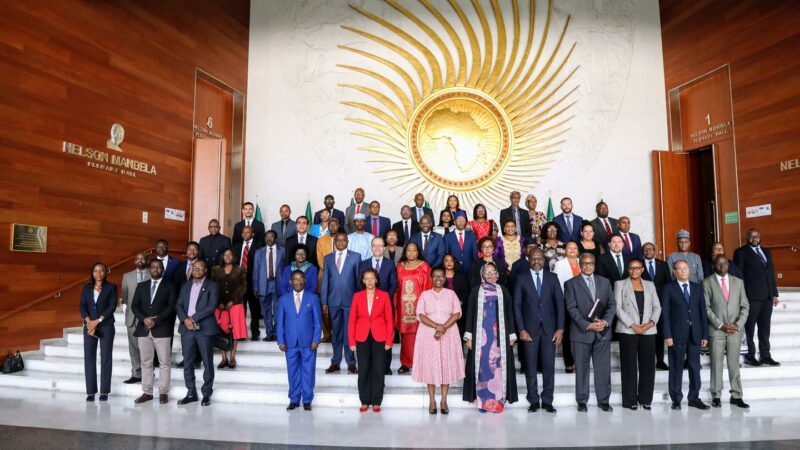
The African Union Permanent Representatives’ Committee members at the African Union headquarters. Image from African Union X page, used with permission.
By Mohamed Mohamud
The African Union (AU) has adopted its theme for 2025 as “Justice for Africans and People of African Descent Through Reparations,” a commitment to redress historical injustices caused by slavery, colonialism, and systemic discrimination. This initiative seeks to acknowledge and rectify the enduring impacts of injustices on African communities worldwide.
At the core of this movement is the reclamation of African narratives. Centuries of being overshadowed and misrepresented by colonial and other external perspectives have portrayed the continent through a lens of primitivism and inferiority. Such depictions served to justify colonial subjugation and exploitation.
African writers and storytellers
Some African writers and storytellers have worked to create literature representative of their people’s genuine experiences. They confronted colonial myths head on and asserted the rich cultural heritage of the continent.
Among them is Ngũgῖ wa Thiong’o from Kenya, an outspoken voice in the decolonization of African literature using African languages as a cornerstone for the preservation and promotion of indigenous narratives.
Bessie Head was an internationally acclaimed South African-born writer and a brilliant example of a storyteller who reflected her people in a very realistic light. Her “When Rain Clouds Gather” is a sensitive portrayal of rural life in Botswana, with exile, identity, and survival. Through her writings, Head sheds light on the struggles of different communities and delve deep into profound issues of social justice and complexities of post-colonial transitions. Her work remains a powerful testament to the lived realities of African societies.
Why Africans must tell their own stories
The importance of such storytelling is heightened in 2025 since the AU places an emphasis on reparations — a process that basically underscores the imperative to reclaim the agency of narration for African stories themselves. Redress of historical injustices involves not only material restitution but also repair of dignity and identity. Thus, telling their own story enables Africans and people of African descent to confront and dismantle the indelible damage that colonialism and slavery have left on them.
Besides, these stories help in the preservation of heritage. Most of the cultures of Africa have been based on oral traditions for long periods, whereby knowledge, values, and history were passed on from generation to generation. Writing these stories down in both printed and digital formats during the modern age will help preserve them against globalization and cultural homogenization. This is important to maintaining the unique identity of African peoples and their communities, thus creating a feeling of continuity and resilience.
Impact of some African literary giants
The global recognition of African literature amplifies this further. Writers like Chinua Achebe and Chimamanda Ngozi Adichie have been acclaimed worldwide, setting African stories on the stage within global literary circles. Stereotypes are thus challenged, offering subtle insights into African societies, allowing readers around the world to better engage with the continent beyond the superficial.
Achebe and Adichie have greatly shaped the African identity in thought and word, imbuing into their communities the idea of survival. Achebe, reputed to be the father of African literature, spoke right against colonial discourses through his influential novel “Things Fall Apart.” By portraying a pre-colonial Igbo society with its full nuance, Achebe managed to take back the history and culture of Africans from reductive perspectives on the part of the West. His works reflect the dignity and richness of African traditions while exposing the disrupting influences of colonization, thus allowing readers to connect with a shared heritage.
Similarly, Adichie takes this inheritance into the present with her work. Renowned for her novels, which include “Half of a Yellow Sun,” she carries the historical eye toward the insight of Nigeria’s Biafran War. Adichie’s stories celebrate the resilience of African communities; it shows ordinary people navigating extraordinary challenges. Her emphasis has been on the multiplicity of African experiences, fighting stereotypes, and reinforcing a dynamic, evolving sense of identity.
Storytelling, in this context, is a form of intellectual and cultural restitution. If financial compensation can address economic disparities, reclaiming narratives confronts the epistemic injustices inflicted upon African peoples. It allows for a correction of historical records, celebration of African achievements, and acknowledgment of the continent’s contributions to global civilization.
These stories also inspire generations that follow . In the case of a young African or person of African descent, being able to visualize their history and culture represented provides the basis for developing better self-esteem. This empowerment is crucial to build leaders who are proud of their heritage and will drive change in their communities with pride.
The 2025 theme of the AU also focuses on unity among Africans and the diaspora. Shared stories can transcend the barriers of distance and culture into one single identity across borders. This unity is necessary to galvanize efforts toward reparative justice, with all voices of the Africans and people of African descent being heard and valued.
As the African Union declares 2025 the year of “Justice for Africans and People of African Descent Through Reparations,” the role of African writers and storytellers in reclaiming the narrative is increasingly important. In developing this art, these storytellers challenge historical misrepresentations, preserve the culture, and empower future generations. Their contributions are essential to the wider movement of reparative justice, ensuring that Africans and people of African descent define their own stories and, in so doing, take their rightful place in world history.

